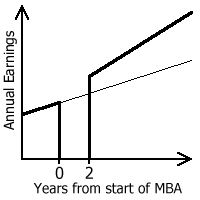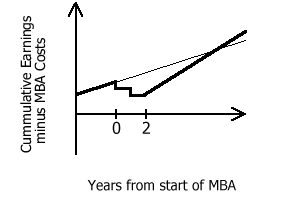 |
|
 Dear Mentor:
Dear Mentor:
Dear MBA Analyzer:
We are impressed by your thoughtful inquiry. You are already on track for making good business decisions. Any problem solving technique requires one to identify options, evaluate each option using some objective criteria, and then make decisions.
The options you are considering are obviously your life with and without an MBA. But what are your evaluation criteria? The criteria should include your goals, ambitions, and interests. Let us propose some criteria: financial rewards (implicit in your inquiry), personal enrichment, and quality of work.
The issue of financial rewards is fairly straightforward. You need to compare the trajectory of career progression and associated remuneration for life with and without MBA. In a typical situation, and you may not be typical at all, an MBA graduate from a top school starts from a higher level of compensation with higher trajectory for income increases. But you do lose 2 years of compensation while being in the MBA school. If you leave aside the direct cost of an MBA itself, the following illustrates your earnings.
In terms of personal enrichment and quality of work, the evaluation is person-specific. No doubt you will learn new and more valuable things in an MBA program. Your career track will be management. You will make business decisions, not technology decisions. Is this the right track for you? Only you can answer the question. We have addressed the issue of preparing for entrance exams in an earlier Dear Mentor column. You may wish to visit: The issue of suitable institute depends on your performance, both academic and on entrance exams. In the iMahal Education Channel, you can find:
|
 |
|
 |
|||||



